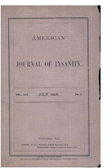Immunity in young adults with major depressive disorder
Abstract
OBJECTIVE: The authors previously found evidence for an age-related association between major depression and altered immunity. The present study was designed to assess a range of immune measures in young adults with major depression. METHOD: A homogeneous group of 21 unmedicated, ambulatory young adults with unipolar major depressive episode, as determined with the Structured Clinical Interview for DSM-III-R, were assessed in comparison with 21 matched nondepressed subjects. An extended battery of quantitative and functional immune measures was obtained on the same day from depressed and nondepressed subjects. RESULTS: Young adult subjects with major depression had more circulating leukocytes and granulocytes, fewer CD56+ (natural killer [NK]) cells, and, when the number of circulating NK cells was controlled, less NK cell activity. Mitogen responses, consistent with the authors' previous report, showed little difference between the young adults with and without major depression except for a possibly greater response at the highest dose of phytohemagglutinin. CONCLUSIONS: Major depression in young adults is associated with alterations in aspects of the immune system primarily involving NK cells. Some but not all these immune changes differ from those found in older depressed adults.
Access content
To read the fulltext, please use one of the options below to sign in or purchase access.- Personal login
- Institutional Login
- Sign in via OpenAthens
- Register for access
-
Please login/register if you wish to pair your device and check access availability.
Not a subscriber?
PsychiatryOnline subscription options offer access to the DSM-5 library, books, journals, CME, and patient resources. This all-in-one virtual library provides psychiatrists and mental health professionals with key resources for diagnosis, treatment, research, and professional development.
Need more help? PsychiatryOnline Customer Service may be reached by emailing [email protected] or by calling 800-368-5777 (in the U.S.) or 703-907-7322 (outside the U.S.).



